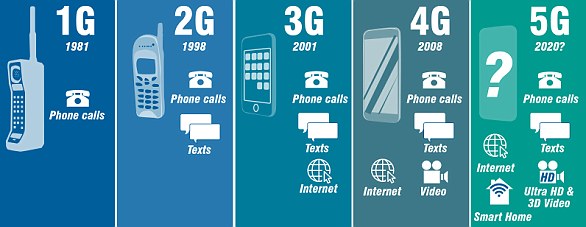Vodafone is back online after a three-hour outage that left thousands of Britons unable to use the internet on their smartphones
It is one of the UK’s most popular network providers, but Vodafone is only back online after being offline for three hours this afternoon.
According to Down Detector, the issues started around 12:30pm BST and continued to affect thousands of users in the UK until almost 4pm BST.
Of those who reported problems, 38 percent said they had problems with their mobile phone, while 33 percent had no access to mobile internet.
The remaining 28 percent indicated that the problem was with the fixed internet.
A Vodafone spokesperson told MailOnline: ‘We are aware of a technical issue that affected some customers today. The issue has now been resolved.’
It’s one of the UK’s most popular network providers, but it appears Vodafone was down for three hours this afternoon
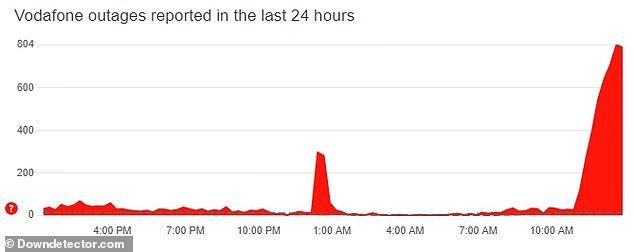
According to Downdetector, the connectivity issues began around 12:30pm when users across the UK found they were unable to access mobile services

Frustrated customers took to X, formerly Twitter, to complain that their service was disrupted this afternoon
When the outage occurred, many frustrated users took to X (formerly Twitter) to discuss the issues.
‘@VodafoneUK your 4g/5g network is down. Nothing loads for me despite good signal,’ one user tweeted.
Another added: ‘@VodafoneUK what is going on???? No network coverage and I need it for work! It’s clearly a nationwide problem! I’m in Dorset. Be honest – don’t criticize me!’
And one voiced his displeasure: ‘Hey, there seems to be a problem with your network today. Judging by the sheer volume of customer contact, I’m guessing a nationwide outage? Anyone have any idea when things will be back to normal?’

Other customers complained that the outage disrupted their work
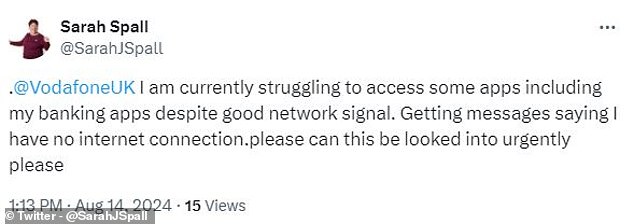
Other customers on social media stressed the urgency of the situation, as the outage at Vodafone left them locked out of essential banking services
On social media, some people expressed their frustration about the disruption the outage had already caused.
One commenter wrote: ‘When will this glitch be fixed? I need it for work. I’ve thought about leaving, this could be the nail in the coffin.’
“My phone says I have 5G but I can’t open important things like my Banking Apps. I have bills to pay,” complained another.
Another added: ‘I’m currently struggling to access some apps, including my banking apps, despite a good network signal.’
After the first problems arose around noon, the number of reported disruptions continued to increase in the hours that followed.

One customer said he was unable to pay his bills due to the ongoing disruption
As of 1:13pm, Downdetector reported 928 reports of service interruptions, with most of them concentrated in London, Birmingham, Manchester and Glasgow.
A common issue, reported by many on social media, was that customers were unable to access online services despite an apparently good mobile connection.
Some customers also noted that their phone still appeared to be connected to 4G or 5G networks, but still could not access mobile data services.
To see if services in your area are currently affected, you can use the company’s Network Status Tracker.
You can easily do this online or via the Network Status Check page in the My Vodafone app.
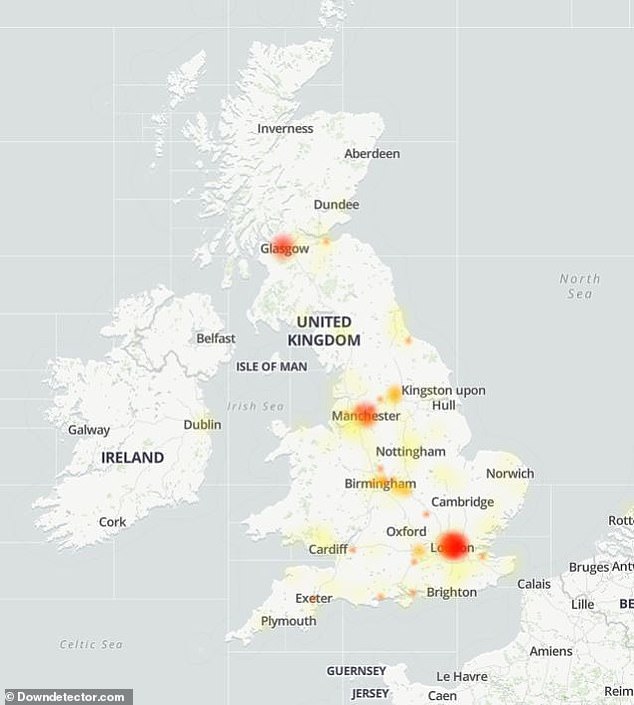
Downdetector data showed that most initial disruptions occurred in London, Birmingham, Manchester and Glasgow, but they have also been detected more widely
Customers can also sign up for network service notifications, so they can be notified of unexpected issues or planned maintenance in their area.
Vodafone is one of the largest mobile network operators in the UK, providing mobile services to 18.64 million customers and broadband to a further 1.38 million customers.
However, the company has had a number of recent outages this year.
Customers recently reported a similar service outage in July, which left them unable to access services for several hours.
Earlier this year, Vodafone also left millions of British users without internet access when the company switched off its 3G network.
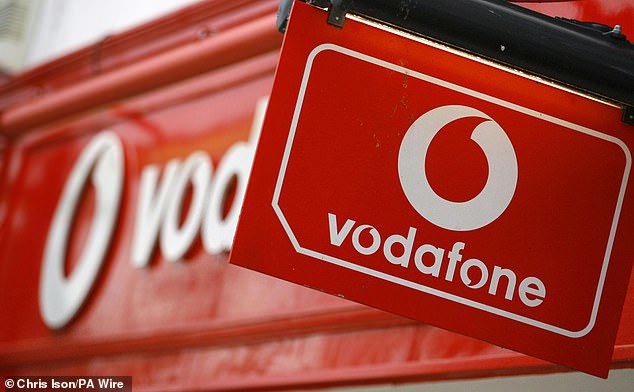
To see if your services are affected, you can use the Network Status Checker in the My Vodafone app
The company shut down its old network to invest more money in 4G and 5G, which most customers now use.
However, for people with an older 3G connection, the switch meant having to buy a new phone.
The company has also struggled financially in recent years and was forced to lay off 11,000 employees as part of a cost-cutting measure.
However, there is no evidence that these mass layoffs are responsible for the current service disruptions.
A Vodafone spokesperson said: ‘We thank our customers for their patience and apologise for any inconvenience caused.’

